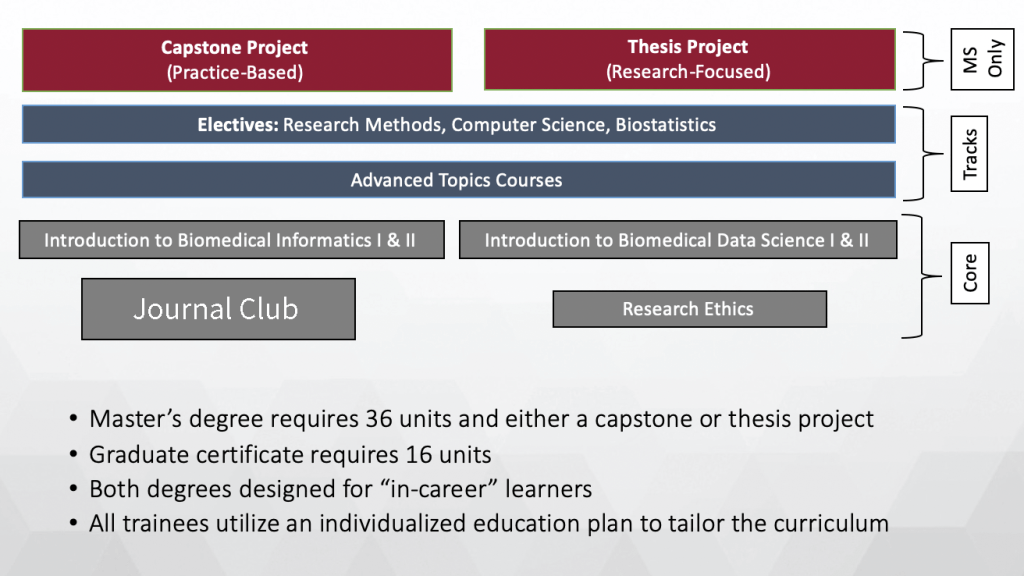The interdisciplinary MS and certificate programs in Biomedical Informatics provide students with a competency-based training in core biomedical informatics theories and methods to address the fundamental shift health and life sciences are experiencing toward transdisciplinary, integrative and data-intensive approaches to research.
These developments, coupled with the use of information technology platforms, are helping transform healthcare, achieving greater value alongside improved outcomes and safety. The complex data, information and knowledge needs associated with these changes requires a comprehensive approach to biomedical informatics research, education and practice.
“The MS in Biomedical Informatics provides the concepts and practice to confidently access and analyze health data with clinicians.”
Douglas Caruthers, MS ‘22
Program Directors

Po-Yin Yen, PhD, RN, FACMI, FAMIA, FAAN
Associate Professor of Medicine, Division of General Medicine & Geriatrics
Associate Professor, Goldfarb School of Nursing, Barnes Jewish College
- Email: yenp@nospam.wustl.edu
Recent college graduates and in-career learners with training in biology, research and clinical medicine, computer science, data science and analytics, statistics, engineering and related disciplines are encouraged to apply. Applications are open on September 1 for the following academic year and are accepted for the Certificate and part-time MS programs on rolling basis through July 15. The full-time MS application closes on Jan. 31. Please note that students are only admitted for fall entry at this time.
In addition to the online application, you will be required to submit:
- Statement of purpose
Provide a personal statement that describes your specific interests in the field of biostatistics, data science, and/or biomedical informatics. Your essay should be up to two pages, single spaced, and should address the following:- Factors influencing you to apply to this program in Biostatistics, Data Science, or Biomedical Informatics
- Long-term career goals and why this program is a good fit for you to achieve those goals
- Relevant work, research, volunteer, or other experiences that will contribute to your overall success as a graduate student, investigator, data scientist within health research
- Specific health topics and/or research methods that interest you
- Any personal hardships or obstacles encountered that have impacted or influenced you
- CV or résumé
- Kira Virtual Interview
- Students will complete an online interview assessment, and a link to access their online assessment will become available to them upon submission of their application materials.
- Your Kira assessment gives you the flexibility to show us who you are, when and where it’s convenient for you. By removing the travel and time costs associated with face-to-face interviews, we aim to make it easier for us to get to know each other better.
- Assessing applicants in Kira Talent helps our admissions team mitigate the impact of bias in the admissions process. Your responses will be independently evaluated by multiple reviewers who will assess your strengths using competency-based criteria and structured rubrics. This process not only ensures consistency in the way that we assess and score our applicants, it also means that your success doesn’t rest on a single reviewer.
- The Kira platform is fully accessible in accordance with WCAG 2.0 AA standards, giving all applicants an equal opportunity to impress. If you’d like to request additional accommodation, please contact us.
- Three academic letters of recommendation (two for Certificate applicants)
At least two letters should be from recent academic advisors, instructors, or current supervisors. - Documentation of degrees and transcripts
Unofficial transcripts are sufficient for initial application review. However, if admitted, official transcripts of all academic work at the higher education level are to be submitted either electronically to I2DB-Education@wustl.edu (preferred method) or in a sealed envelope sent directly by the university to the address below. Transcripts must include the grading scale. - Applicants who have completed or are in the process of completing an undergraduate or graduate degree at institutions outside of the United States are required to submit academic records to complete their credential evaluation through World Education Services(WES).
- Evaluations are a required component since they determine how your academics are graded compared to the U.S. education system. Be sure to follow the steps below to secure your credential evaluation:
- Applicants can create a WES account by visiting: https://applications.wes.org/createaccount/login/login
- Select the course-by-course evaluation option to ensure that your evaluation meets our requirements for admission review.
- To ensure that Washington University School of Medicine Institute for Informatics, Data Science and Biostatistics receives an official copy of your evaluation, select it from the drop-down box and add it as a recipient.
- If you provided a WES transcript reflecting in-progress study, a follow-up WES course-by-course evaluation showing the complete academic record and degree conferral could be required. Applicants are responsible for paying all fees for such evaluations, upgrades, as well as making arrangements with WES to send and receive their documents.
- International applicants must have all transcripts officially translated into English. Both the unofficial and the English-translated version must be submitted. WES evaluations do not include translation services. WES does not provide translation services.
- Evaluations are a required component since they determine how your academics are graded compared to the U.S. education system. Be sure to follow the steps below to secure your credential evaluation:
- Official TOEFL or IELTS Scores ‡
The TOEFL or IELTS is required for all international applicants. See waiver eligibility requirements below. If you already have notification of your score, please attach a copy with your application. The test must have been taken within the last 2 years. Scores must be submitted at the time of submitting your application.
The official TOEFL scores should be sent directly to Washington University in St. Louis (the code is 6929). For IELTS, please send official scores electronically to Washington University in St. Louis Graduate Admissions.
English Proficiency Standards for Admission to Washington University in St. Louis & Visa Issuance U.S. Citizenship and Immigration Services (USCIS) requires universities admitting international students to verify that each non-native English-speaking student has sufficient English language proficiency to succeed in the academic program. Therefore, admitting departments must present proof of this level of proficiency for each non-native English-speaking student before visa eligibility documents can be processed by the Office for International Students and Scholars (OISS)
Fulfilling the USCIS Requirement To fulfill this requirement, applicants must take the TOEFL iBT or IELTS. Applicants will provide an official score report showing a score at or above the following minimum levels:
| ELP Test | University Minimum | Program Minimum |
|---|---|---|
| IELTS | 6.5 | 7.0 |
| TOEFL | 90 | 100 |
- For an applicant’s official test score to be valid for the purpose of English proficiency certification, the applicant must take the test less than two years before requesting that the score be reported to the university.†
Programs with High English Communication Demands
For programs whose students will serve as associates in instruction, do extensive reading and writing, complete a practicum or clinical experience, or otherwise meet a particularly high standard of English proficiency, departments are encouraged to establish a minimum score of 100 on the TOEFL iBT or 7 on the IELTS Academic module.‡
Waiving the English Proficiency Test Requirement
The English proficiency test requirement is waived for citizens of Australia, Cameroon, Commonwealth Caribbean nations, Ghana, India, Ireland, Kenya, Liberia, New Zealand, Nigeria, Singapore, Uganda, the United Kingdom, and Zimbabwe. It may also be waived for students who have completed three or more years of study in an approved English-medium academic program in any of the aforementioned countries, Canada, Hong Kong, South Africa, or the United States. If a student has completed three or more years of study in an English-medium university-level academic program in a country other than the ones listed above, the admitting department will need to request a waiver on a case-by-case basis. In this case, the department is responsible for providing documentation to support this request (e.g., proof of appropriate minimum English proficiency standards at that university). - WashU English Language Course
We will require that all students who have not completed three or more years of consecutive study in the US or a predominately English-speaking country enroll in U15-1120 English Advantage: Biostatistics & Biomedical Informatics at the student’s own expense during their first fall term.
- GRE scores are not required for the MS BMI application and thus will not be considered during application review.
Prerequisites
Program prerequisites: Acceptance into the MS in Biomedical Informatics program requires knowledge of statistics, either through successful completion of an introductory course or through professional experience. Applicants must also possess strong quantitative skills including at least one advanced math course (e.g. Calculus I) and proficiency in at least one programming language (e.g. R, Python, etc.).
All qualified applicants will be asked to participate in a telephone or virtual meeting interview before a final admission decision is made.
Supporting documents should be sent electronically to I2DB-Education@wustl.edu (preferred method) or be mailed to the following physical address:
Special Programs Administrator
Office of Health Information and Data Science
Washington University in St. Louis, School of Medicine
660 S. Euclid Ave, Campus Box 8067
St. Louis, MO 63110
Application open: Sept. 1
Please note that at this time, students are admitted for fall entry only.
Application deadline:
- Full-time MS program: Jan. 31
- Part-time MS program: July 15
- Certificate program: July 15
I2DB application fee:
- MS program: $50.00
- Certificate program: $25.00
Eligibility for a fee waiver is assessed on submission of an application. Waivers are granted for a variety of volunteer service-based organizations, scholar programs, and academic pipeline programs (full list on application). Fee waivers are also available for current WashU students, alumni and employees.
If you think you may qualify for a fee waiver based on one or more of these criteria, please email I2DB-Education@wustl.edu. Please Note: International students residing outside the United States are not eligible for a fee waiver unless you meet the above criteria.
An application must be started before requesting a fee waiver. If you believe you qualify for a waiver, please email I2DB-Education@wustl.edu.
Having problems or difficulties with the application system? Email help@applyweb.com for help.
Washington University encourages and gives full consideration to all applicants for admission, financial aid, and employment. The University does not discriminate in access to, or treatment or employment in, its programs and activities on the basis of race, color, age, religion, sex, sexual orientation, gender identity or expression, national origin, veteran status, disability, or genetic information. Inquiries about compliance should be addressed to the University’s Vice-Chancellor for Human Resources, Washington University, Campus Box 1184, One Brookings Drive, St. Louis, MO 63130.
Interested in applying? Please join our mailing list for more information, fill out the inquiry form, or email I2DB-Education@wustl.edu.
Single Course Non-Degree (SCND)
Those interested in enrolling in our courses as a non-degree seeking student must submit an application. Applicants will need to submit a resume, courses interested in enrolling, and how prerequisites have been met. Official transcripts may be requested.

Core Courses: All Tracks
All students in both the certificate and the Master of Science (MS) programs in Biomedical Informatics (BMI) will be expected to take the core classes listed below:
- M18 5302 Introduction to Biomedical Informatics I – 3 units
- M18 5303 Introduction to Biomedical Informatics II – 3 units
- M18 5304 Introduction to Biomedical Data Science I – 3 units
- M18 5305 Introduction to Biomedical Data Science II – 3 units
Core Courses: MS Program
- M18 5200 Biomedical Informatics Research in Progress – 2 units
- Research hours may include up to ten units in rotations, research, and courses related to capstone and thesis work.
- M18 5201 Rotation – 2 units
- M18 5401 Capstone or M18 5402 Thesis – 3 units
- One Advanced Topics Course – 3 units
- M18 5204 Mixed Methods in Biomedical Informatics
- M18 5205 The Electronic Health Record
Competencies: MS Program
Students in the MS in BMI will be expected to have competency in Scientific Writing by the time of graduation. Students who have taken the equivalent at other institutions may be excused from this course with permission from the director. If the competency has not been met, the student will enroll in M17 – 529 Scientific Writing and Publishing (2 credit hours). These credit hours do not count towards the 36 credit hours required for the MS Program.
Electives
Students may take approved electives in computer science, medicine, business, basic science, and public health based on their track with approval from their academic advisor. Some suggested electives include:
- M21 503 Statistical Computing with SAS
- M21 506 Introduction to R for Data Science
- M21 560 Biostatistics I
- M21 570 Biostatistics II
Earning a Certificate in Biomedical Informatics
The certificate program is ideal for working professionals. It requires 16 credits, including the option for a mini-capstone project. Expected completion time is one to three years.
Washington University employees may be eligible for a 50 percent tuition assistance benefit after one year of full-time employment.
For matriculating students starting Fall 2024, tuition is set at:
- $1,525 per credit hour.
- $742.50 per credit hour for auditing.
- For the 2025-2026 academic year, the tuition will be $1,560.
- The projected degree tuition for the 36 credit hour MS program is approximately $54,900.
- The projected certificate tuition for the 16 credit hour program is approximately $24,400.
Additional notes:
- Matriculation deposit is $250 for MS students. A partial deposit is returned to matriculating students in the first fall semester. Full-time students will receive $150 from the deposit. The remaining $100 will be used towards graduation fees, including regalia orders. No deposit is required for part-time students.
- Student Health: All full–time WashU Med I2DB students are required to have WashU Student Health Insurance. All full-time WashU Med I2DB incoming students are required to meet certain entrance health requirements. Incomplete information will result in a student’s inability to attend classes. Failure to comply will result in a $95.00 late fee. The student health fee will be $5,225 (includes FL25 and SP26).
- An opt-out option is now available for domestic full-time applicants. This will require students to provide proof of insurance before they are able to submit the opt-out request. By opting out, you will agree to pay a student access fee of $1300 per semester, which will cover all the basic requirements for any student attending classes on the med school campus. International students are not eligible for the opt-out.
- Services Covered by the Student Occupational Health Fee:
- Essential Medical Consultations: Includes vaccination compliance, medical history reviews for N-95 fit testing, and other health assessments related to workplace requirements.
- Preventive Care: Management of required vaccinations, as well as record-keeping to ensure compliance with pre-matriculation and institutional health requirements.
- Laboratory Services: Testing related to occupational exposures (e.g., bloodborne pathogen testing, such as for needlesticks) and health screenings, including COVID, flu, and strep tests, when tied to workplace health protocols.
- Mental Health Services: Six zero-fee counseling sessions through the Student Assistance Program, offering 24/7 support.
- Services Covered by the Student Occupational Health Fee:
- An opt-out option is now available for domestic full-time applicants. This will require students to provide proof of insurance before they are able to submit the opt-out request. By opting out, you will agree to pay a student access fee of $1300 per semester, which will cover all the basic requirements for any student attending classes on the med school campus. International students are not eligible for the opt-out.
- All students are required to bring a laptop. Information on minimum specifications can be found here.
- Faculty or staff pursuing the MS in Biomedical Informatics are eligible for 50% of part-time evening program graduate tuition costs for up to seven (7) credit hours per semester. For additional information, please visit the Employee Tuition Assistance page.
- Tuition is payable incrementally each semester and is due at least one week before each semester begins. Students can check their account status and make payments online via WebSTAC. Tuition paid by check should indicate the student’s official name and student ID number and should be mailed to:
Washington University in St. Louis
P.O. Box 14627
St. Louis, MO 63150-4627
Visit the Financial Services website for further payment instructions.
Who should apply?
Recent college graduates with backgrounds in the biological and/or computational sciences
In-career learners with a broad range of experiences in biomedicine/biosciences, mathematics, physical or computer information sciences or engineering, and cognitive and/or social sciences
What interest areas are available?
This master’s degree program offers grounded theory and a broad range of applied skills for three areas of interest:
- Applied Clinical Informatics
- Population Health Informatics
- Translational Bioinformatics
Students will have the opportunity to personalize their approved electives and competency courses based on their interest and educational and professional backgrounds, allowing them to build on their existing biomedical informatics competencies while gaining hands-on experiential learning opportunities. With the cutting-edge biomedical research being highly funded by the National Institutes of Health and other funding agencies, part-time employment opportunities including Research Assistantships are frequently available throughout Washington University School of Medicine in St. Louis. Students may apply for these opportunities upon completing their first semester.
Washington University School of Medicine in St. Louis strives to support all learners, faculty and staff in the academic medical center in providing an environment conducive to learning, research and high-quality patient care. To report a concern regarding mistreatment or unprofessional behavior in the learning environment, please visit safereporting.wustl.edu.
If you’d like to learn more about our medical campus, the surrounding community, or St. Louis, please visit WashU School of Medicine’s About St. Louis page.

Po-Yin Yen, PhD, RN, FACMI, FAMIA, FAAN
Associate Professor of Medicine, Division of General Medicine & Geriatrics
Associate Professor, Goldfarb School of Nursing, Barnes Jewish College
- Email: yenp@nospam.wustl.edu


